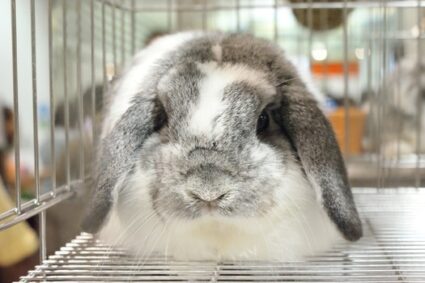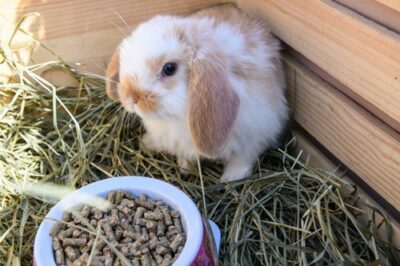Rabbits dislike being left alone. They become lonely without company, which can lead to stress and ill health. Your rabbit may also start to fear for her safety as she’s a prey animal.
If you have two or more rabbits, they will likely be happy and contented for approximately 24 hours. If you only have one rabbit, she’ll start to become distressed in less than 12 hours.
Ask a friend or family member to check in on her regularly if you’re busy at work or away on vacation. Your rabbit’s food and water must be changed daily. She will also need daily exercise, and to have her hutch cleaned in order to prevent illness and disease.
How Long Can a Rabbit be Left Alone?
An unbonded or lone rabbit should not be on its own for more than a regular working day. These animals are social and loathe being alone. It makes them feel very stressed and anxious.
If it’s possible, keep two bonded rabbits together. This way, the rabbits can be left alone for a little longer. The two animals will keep each other company. They will also take care of each other’s play and grooming needs.
Even if you have a pair of rabbits, 24 hours is the maximum time they should be alone. Like all pets, rabbits rely heavily on their owners. Domesticated rabbits lack the survival skills of wild rabbits.
Your rabbit has basic needs surrounding food, exercise, and stimulation.
Can You Leave a Rabbit Alone Overnight?
In the event of an emergency, you may need to leave your rabbit alone overnight. Most rabbits will be fine. Your pet will not like it, especially if she does not have a companion.
Before you leave your rabbit, ensure that you have taken all necessary care steps. Clean her hutch thoroughly. Fill the hutch with fresh hay. Groom your rabbit. Fill her hutch with new toys and other forms of entertainment.
Also, ensure that your rabbit is safe and secure in her hutch. If necessary, cover it with a tarpaulin or blanket. Tend to your rabbit the moment you return and make a fuss of her.
Can You Leave a Rabbit Alone for a Weekend?
Anything longer than 24 hours is an unacceptable level of time alone for a rabbit. By the time day two rolls around, your pet will be growing anxious. She will wonder why you’ve not visited.
A rabbit locked in a hutch for a weekend will also not be able to exercise. This will not do. Rabbits need to run free for at least two hours a day. If your pet is cooped up for days, she’ll go stir-crazy.
This could manifest in several ways. Your rabbit may become withdrawn or depressed. On the other hand, she may become frantic and aggressive. She will also likely attempt to escape her hutch. If she bites a hole in the wire of her cage, you’ll never see your rabbit again.
You also need to consider food and water over a weekend. What happens if your rabbit knocks over her water bowl, or her bottle freezes? What if her hay turns moldy? What if the stress of being left alone means that she refuses to eat?
Can You Leave a Rabbit Alone for a Week?
You may need to leave your rabbit for 3 days or 4 days. It could even be longer than this if you’re planning a vacation. In such instances, you must arrange reliable pet care.
If you can, look into a small animal boarding house. These establishments are similar to catteries and dog kennels. They’ll care for your pet while you’re away. All her needs will be met, and your rabbit will have regular company.
Some cat and dog shelters also accept rabbits. It’s inadvisable to place your pet in such a place. The change of scenery will already stress her and miss you. Forcing her to share space with natural predators will escalate this anxiety.
If you cannot find a boarding house, ask a friend or family member to care for your rabbit. Simply visiting will not be sufficient for this period of time.
Things to Arrange When Leaving a Rabbit Alone
Sometimes, leaving a rabbit alone is unavoidable. You may have a family emergency that involves travel. Alternatively, you may be summoned to a work meeting far from home.
It’s best to prepare for these eventualities in advance. Appoint a friend, neighbor or family member as your rabbit’s secondary caregiver. This will need to be somebody that likes rabbits. Your pet must also feel safe with this individual.

Attention and Company
Above all else, your rabbit needs companionship. She will miss you while you’re away. Another human may not be the same, but most rabbits will take any company that’s on offer.
Leave your rabbit something that smells of you. Rabbits have strong noses, so this will keep her comfortable. This means that she is more likely to accept other company.
Draw up your rabbit’s typical schedule for her temporary guardian. Most rabbits are used to having company and attention at particular times. If this routine can be maintained, your pet will be happier.
Exercise
Make sure your rabbit still gets her daily allocation of exercise. Remember, she needs to run free for at least two hours.
If necessary, invest in safety equipment that makes this possible. Pet stores will sell rabbit playpens. This can be set up in a yard, allowing your rabbit to run off her energy.
Discuss these exercise needs with your rabbit’s caregiver. Ensure that your pet will be kept safe, and supervised while exercising. Rabbits are curious, and that gets them into trouble. If your pet escapes the yard of a new home, she could be in danger.
Safety
Before committing to a pet caregiver, ensure their territory is safe. If wild predators are regular visitors to the property, look elsewhere.
If it’s an acceptable proposition, ask your pet’s guardian to house your rabbit indoors. This way, she’ll be less frightened by night. Explain that rabbits do not smell, and are quiet pets.
If this is not an option, consider additional safety precautions. A Perspex cover over your rabbit’s hutch door, for example. This is an additional barrier between your pet and predators. Just leave enough space for ventilation.
Your rabbit’s guardian must understand the importance of safety. This means recognizing dangerous animals and health risks. Ensure that your pet’s guardian understands vocal cues or body language that denotes stress or sickness.
Food and Water
Ensure that your rabbit’s food and water supplies are topped up while you’re gone. It can be so easy to overlook. Rabbits should have their water changed twice a day. Fresh hay should also be provided daily.
It’s also vital that your pet’s caregiver understands your rabbit’s diet. Myths abound about what these animals eat. If your rabbit is given a steady diet of carrots and lettuce, she’ll make herself sick.
It’s all too easy to kill a rabbit through inappropriate feeding. Rabbits will beg for food, whether it’s good for them or not. Ensure that she is not given anything that could cause an intestinal blockage.
Cleanliness
Rabbits are typically clean animals. If your absence stresses your pet, she may neglect her grooming. Rabbits must be kept clean, especially around the bottom. Explain the risks of a rabbit that experiences a messy behind. Grooming will also help your pet’s guardian bond with your rabbit.
If you’re away for more than a few days, your rabbit’s hutch will need to be cleaned. Make sure your pet’s guardian knows how to do so. Also, ensure that litter trays are cleaned daily, and moldy food is removed from the hutch.
Can an Indoor Rabbit be Left Alone for Longer?
Keeping rabbits indoors vs. outdoors is a common debate. There are pros and cons to both arrangements. If your rabbit will be left alone for longer periods, she’ll be safer indoors.
She will be safe from predators. Your rabbit will be secure in the home. A possible exception to this is households with cats. A cat may take advantage of your absence and break into your rabbit’s hutch.
An indoor rabbit will also be protected from the elements. If you are away for 3 or 4 days, the weather can change significantly. If your pet lives indoors, storms and sharp drops or inclines in temperature are less concerning. They cope well in cold weather, but heat can kill rabbits.
Arrange for your radio and television to play at random intervals while you’re away. This will go some way to alleviating your pet’s loneliness.
In the event of an absence, ensure that your rabbit’s needs are met. If you are away for anything longer than a day or two, ensure your pet is temporarily rehomed.

